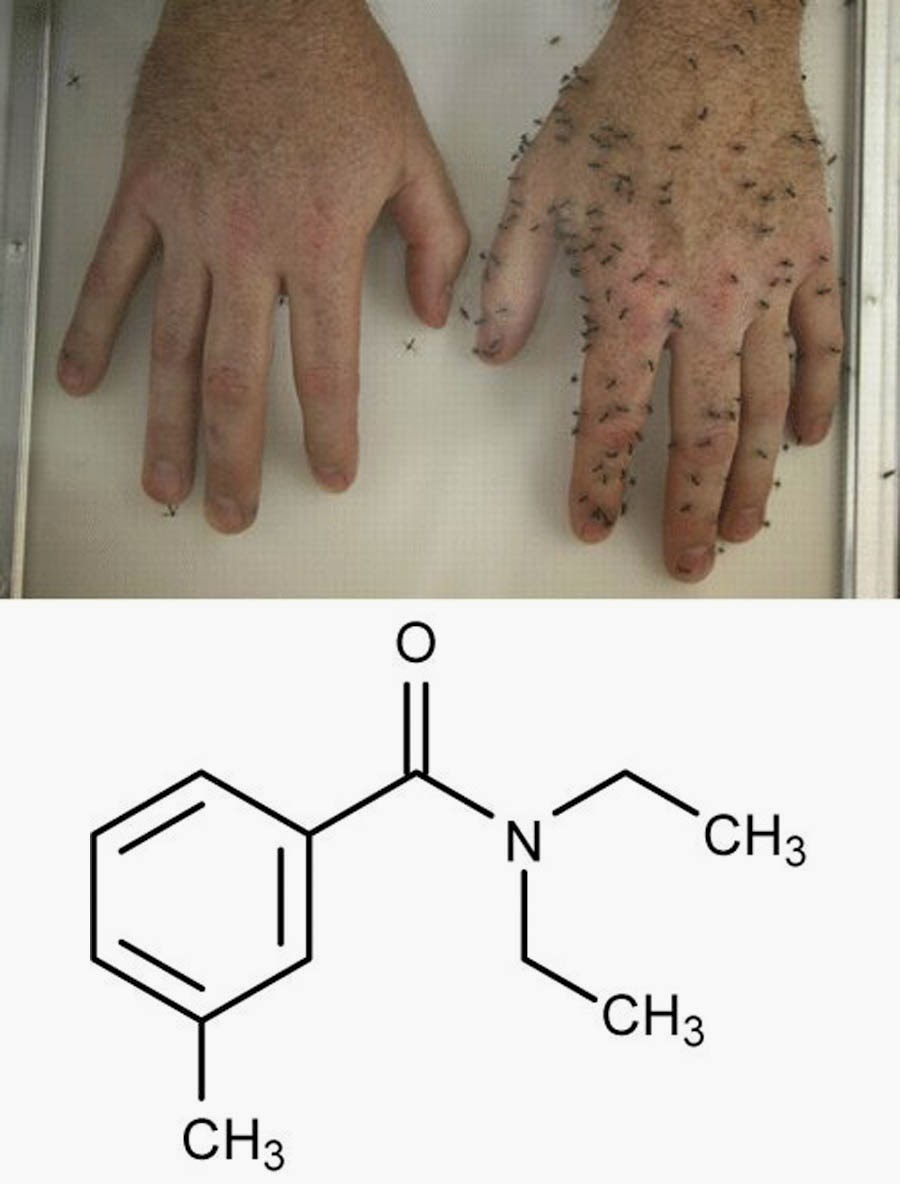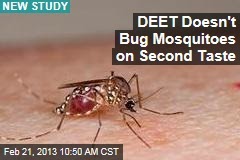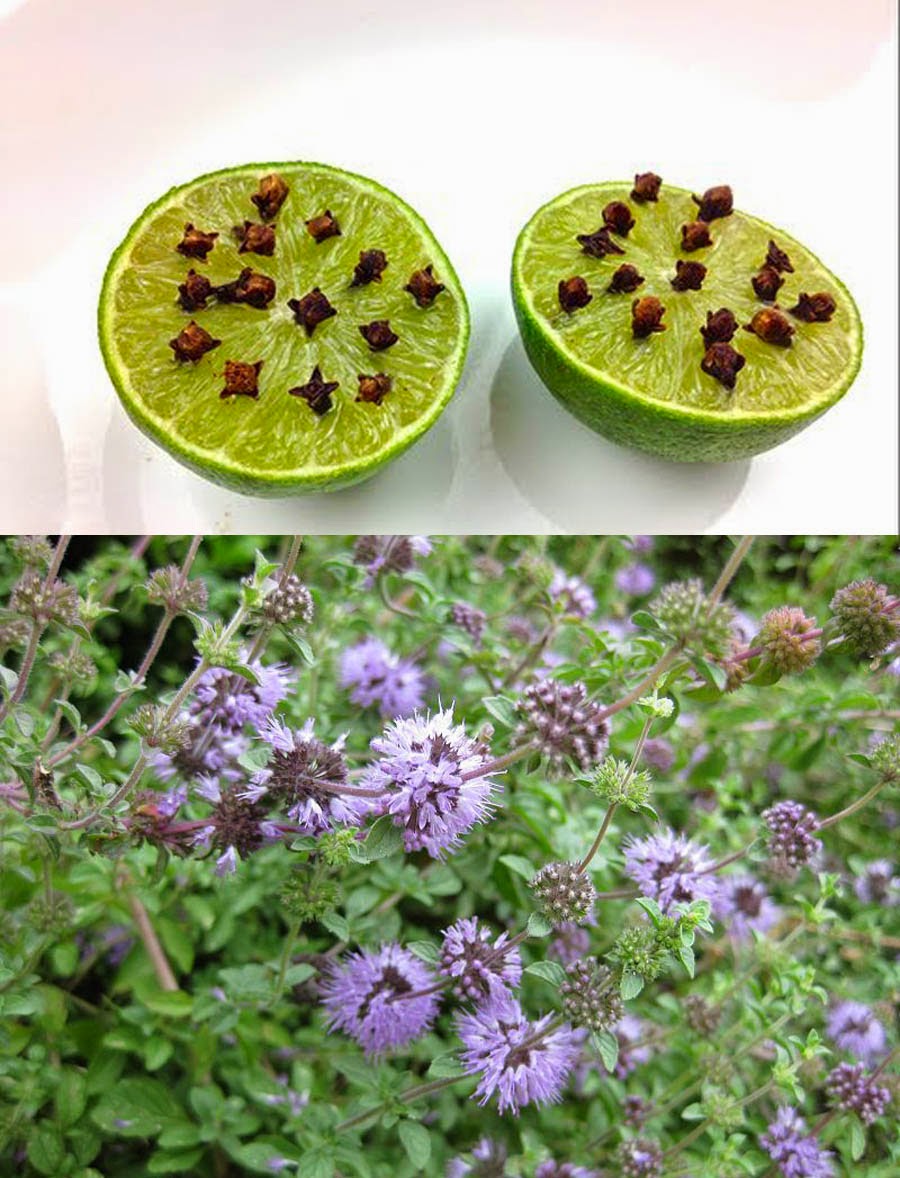Biology
Science exists to describe our universe in terms of rules and mechanisms; what is and how it comes to be. Knowing that something exists is only half the equation. Science seeks to explain how something exists in terms of the rules of the universe. Observation is good, but it only shows us the question ? mechanisms of action and interactions show us the answers.
Despite these issues, the U.S. Environmental Protection Agency (EPA) says citronella is safe and effective as an insect repellent. One weird side issue ? you can take all the lemongrass you want from the US to Canada, where its oil is under attack, but you can?t bring any lemongrass from Canada to the US, where it is considered safe. Hmmmm.
Originally it was believed that DEET disrupted the mosquito?s ability to detect semiochemicals(octenol) produced by mammals, especially humans, so mosquitoes couldn?t find a mammalian host to feed on. Then they played around with the idea that it blocked detection of CO2.
There was an interesting study from 2013that showed that if you mutate or knock out Orco, one of the co-receptors (a protein that works with many different odor receptors so that they can function properly), then two things happened. One, DEET didn?t have any effect on the mosquitoes, and two, mosquitoes that normally preferred humans greatly would then settle for any mammal.
As good as DEET is, people still question whether it?s safe. The EPA in a 2014 review said that DEET is safe for human use and poses no identifiable risks for human health, even in children. But this doesn?t keep people from suspecting chemical usage of carrying negative effects.
DeGennaro M, McBride CS, Seeholzer L, Nakagawa T, Dennis EJ, Goldman C, Jasinskiene N, James AA, & Vosshall LB (2013). orco mutant mosquitoes lose strong preference for humans and are not repelled by volatile DEET. Nature, 498 (7455), 487-91 PMID: 23719379
Stanczyk NM, Brookfield JF, Field LM, & Logan JG (2013). Aedes aegypti mosquitoes exhibit decreased repellency by DEET following previous exposure. PloS one, 8 (2) PMID: 23437043
Klun JA, Kramer M, & Debboun M (2013). Four simple stimuli that induce host-seeking and blood-feeding behaviors in two mosquito species, with a clue to DEET's mode of action. Journal of vector ecology : journal of the Society for Vector Ecology, 38 (1), 143-53 PMID: 23701619
- # 56 Summary Of Infectious Diseases And Antibiotics
1 The term disease is defined as a disorder or illness that disrupts the normal functioning of the body or mind. Infectious diseases are caused by organisms known as pathogens that invade the body. Non-infectious diseases are all other diseases that are...
- #55 Infectious Diseases And Antibiotics
An infectious disease is one that can be passed between one person and another. Infectious diseases are caused by pathogens. These are usually microorganisms such as viruses, bacteria, fungi or protoctists. A non-infectious disease cannot be passed between...
- Human Health And Infectious Diseases
Health is a state of complete physical, mental & social well-being. Health is affected by genetic disorders, Infections, change in life style (food, water, rest, exercise, habits etc).Diseases may be Infectious or Non-infectious. Pathogens: Disease...
- How Do Mosquitoes Find You?
Biology concepts ? semiochemicals, hematophagy, proboscis, thermosensing, TRPA1 Sure, mosquitoes suck blood and pass along malaria that kill more humans than any other infectious disease. But would it be good to get rid of them. They provide food...
- What Cold Really Looks Like
Biology concepts ? TRPA1, cold sensing, oxygen sensing, proteasome function, hypoxia, normoxia, hyperoxia, phototransduction, optogenetics, methyl anthranilate Last week we learned that the TRPA1 ion channel causes you pain when you are too cold and...
Biology
What?s So Repelling About Repellents?
Biology concepts ? thermosensing, repellent, odor receptors, gustatory receptors, semiochemcials
 |
| Science explains our world, and then technology and engineering build a model of that for our use. The better we know how our universe works, the better we can make use of it. In the 1985 film Real Genius, this difference is stated when the scientist students ask what a 6 megawatt laser might be for, one student says, ?Let the engineers figure out a use for it.? In this case, they used it to fill a house with popcorn. |
As an example ? we know that certain naturally occurring oils and well as some man made chemicals keep mosquitoes from feeding on us. This is the observation. But the question is ? how do mosquito repellents work? The answer is more interesting and more complicated than you would initially think. Repellents rarely repel.
Investigating how chemicals keep us from getting bitten will teach us about how the living systems work, will give us a better understanding of our universe, and then give us better insect repellents. Don?t think that?s important? Consider the hundreds of millions of people who are infected every year (several million die) with mosquito-borne diseases (malaria, encephalitis, dengue fever, yellow fever, filiariasis). So yes, we need more repellents.
 |
| Mosquito borne diseases can be unpleasant at best. Top left is filariasis, a worm is transmitted via mosquito and it clogs up your lymphatic vessels, so that body parts swell from excess fluid. Top right ? malaria can result in so much red blood cell lysis that your spleen (the guy who cleans them up) can rupture. Bottom left ? Dengue fever is often called breakbone fever, the pain is not something an image can express. But the hemorrhagic form of the disease can produce some bleeding in weird places. Oh, and it can kill you too. Bottom right ? yellow fever is caused by a virus transmitted by mosquito. Your liver breaks down and causes your whole body to turn yellow and you bleed into your skin. |
We should start with the repellents for which we have good ideas of their mechanism of action. But there aren?t any. We have some hypotheses and working ideas of the modes of action of mosquito repellents, but nothing is definitive yet. Let?s look at two of them and see if we can find some common pathways.
Citronella oil
Citronella is a combination of many different natural oils produced in lemongrass plants (Cymbopogon nardus and Cymbopogon winteratu). As a natural oil and a flavoring in Asian cooking, one would think that citronella oil would be considered just about the safest insect repellent this side of a slap with an open palm.
But no, Canada says that one small component of citronella oil called methyleugenol, can increase the likelihood of tumor formation in rats. Of course this was when methyleugenol was distilled from the oil, given by itself in large doses, and introduced directly into the stomach. But Canada is still in the process of banning citronella oil as an insect repellent. Of course, you can still eat thai food in Canada, which is often flavored with lemongrass.
The EU, on the other hand, said that the repelling function of citronella oil hadn?t been proven and it was deemed illegal to use in the EU in 2006. Oh, you could eat it, and use it soap or perfumes, you just couldn?t use it to keep mosquitoes away. They reconsidered in 2014 and some restricted uses of citronella oil as a repellent are now allowed.
 |
| Citronella oil comes from the lemongrass plant (Cymbopogon nardus or Cymbopogon winteratu). There are two major species for acquiring the oil, and the oil from each is a little different in the percentage of each chemical. Lemon grass is also used in cooking, the woody stalks are used with extra long cook times. The torches that burn citronella oil work pretty well, but you have to stay in the volatilized cloud of oil for them to be efficient. |
Citronella oil probably works in a couple of ways. It's strong and sweet smelling, so it covers up and dilutes the odors that mosquitoes use to find you. If they?re detecting all the citronella in the air, then they aren?t smelling you. But research also shows that citronella oil activates TRPA1 ion channels. In us, they detect cold and noxious chemicals and are interpreted as pain. It is very possible that the detected signals in mosquitoes just come through as something unpleasant and to be avoided.
In this way, citronella would be an actual repellent. It repels on contact as well, as the taste is thought to activate bitter taste receptors and contact greatly reduces feeding time.
But citronella only seems to work when you are in the cloud produced by burning the candles or torches, or within the area of the spray. And if you?re using an oil or cream with citronella, it should really be reapplied every 30-45 minutes - not the most user-friendly method for discouraging pests.
DEET
World War II in the Pacific was an insect nightmare for the US Army. In response to the plethora of insect-borne disease that ran through the allied forces, defense scientists starting looking for better insect repellents. In 1946, their efforts produced N,N-Diethyl-meta-toluamide, or DEET.
Just how they came up with DEET is a mystery to me, it must have been a massive exercise in trial and error. Why? Because we know less about how DEET works than we do about citronella oil. And that?s with the benefit of 40 years of research. They didn?t have a clue how it worked or even what systems it was targeting when developed in the 40?s.
 |
| Guess which hand has been treated with DEET. The mosquitoes come very close to the hand that was treated, but don?t land on it. This argues that DEET is less repelling, than it is disguising. On the right, the structure of DEET is similar to several human semiochemicals, it fits into the lock and key system of several odor receptors and activates or inhibits them. |
More recent studies have been more rigorous, but haven?t helped solve the puzzle. A 2008 study suggested that DEET was actually repellent; the mosquitoes didn?t like the smell and would avoid it. But other studies have shown different mechanisms of action.
A study in the journal Nature in 2011 found that mosquito odor receptors could be confused by DEET. The receptors for octenol were less responsive in the presence of DEET, but other receptors more more responsive. The conclusion of the study was that odorants from humans could be detected, but their pattern was confused, so the mosquito didn?t recognize the target as a target. It?s as if we disappear from the mosquitoes radar when we wear DEET.
A 2010 study showed similar results. DEET activated certain odor receptors but not others when given alone, but the opposite effects were seen when DEET was given in the presence of things from human sweat that would normally attract a mosquito. Once again, the signals were confused. This is really more of a chemical disguise for us, not a repellent. Next time your kids go outside, you should insist that they apply their mosquito confusant.
However, a 2013 study in the Journal of Vector Ecology found that heat and moisture were critical elements for recognition of targets by female mosquitoes, and that DEET messed not with odor, but with detection of heat and/or moisture. Different from the other studies, but still more of a masking than a repellent.
 |
| Something a little disturbing. Mosquitoes can learn to ignore DEET. Most mosquitoes will be confused by DEET and never find you. But if they do and then are repelled by the taste, they learn from that and the second taste is not repellent. Hopefully they just don?t find you a second time. |
Weird - Orco is needed for both DEET to work and for mosquitoes to find humans more attractive. I haven?t figured that one out yet. The researchers showed that DEET only maintained an effect on the Orco mutant mosquitoes when they landed on a DEET covered surface, and then they didn?t like it at all.
This suggested that DEET might have more than one mechanism, confusion in the air and repellent taste on contact. Older studies supported this idea, as a couple of studies in 2005 and 2006 showed that contact with DEET would reduce feeding behavior in mosquitoes and one in 2010 showed that fruit fly bitter taste receptors are activated by DEET.
So, we have studies that say DEET is a confusant rather than a repellent, others that say it is a true obnoxious smell that they can?t stand, and yet others that say DEET is confusing to the smell and repellent to the taste. But there are more. Other studies suggest that DEET actually inhibits the smelling of anything, while others say that it inhibits an important protein called cytochrome p450.
Used commercially since the 1950?s, DEET has been the gold standard for efficiency for many years. Although it has to be used at fairly high concentrations, it can keep mosquitoes away for 4-6 hours at concentrations where citronella oil might work for less than an hour. At 100% concentration, DEET is active for more than 12 hours. What?s more, if you combine DEET with 5% vanillin, it works two hours longer!
 |
| A lime with cloves stuck in it as a mosquito repellent ? really? Well, lime is kind of like citronella oil, and clove has eugenol, which acts on TRPV1 ion channels. But how many would you have to have, or do you wear them like earrings? Penny royal contains menthol and mosquitoes stay away from it. But it also has toxins that will kill you. |
On the other hand, DEET dissolves plastic, foam rubber, spandex, gore-tex, and nylon. I can see where this might make people leery about slathering it on their skin for hours at a time. And a few people are allergic to DEET, so the best current repellent isn?t without some negatives.
One last point ? a newer repellent called picaridinis almost as effective as DEET and doesn?t eat your back packing equipment and clothes. The interesting point is that picaridin is a synthetic version of piperine, the spicy chemical in black peppercorns. Add to this that menthol is also a fairly decent mosquito repellent, and we have some good arguments that TRP receptors might be involved in repelling activity ? as with citronella oil. Piperine is a TRPV1 agonist, and menthol activates TRPM8 and TRPV1. All our talk about spicy food and heat/cold receptors has an impact even in the spread of malaria and other deadly diseases!
Next week, another question to answer - do sunflowers really turn with the sun?
- # 56 Summary Of Infectious Diseases And Antibiotics
1 The term disease is defined as a disorder or illness that disrupts the normal functioning of the body or mind. Infectious diseases are caused by organisms known as pathogens that invade the body. Non-infectious diseases are all other diseases that are...
- #55 Infectious Diseases And Antibiotics
An infectious disease is one that can be passed between one person and another. Infectious diseases are caused by pathogens. These are usually microorganisms such as viruses, bacteria, fungi or protoctists. A non-infectious disease cannot be passed between...
- Human Health And Infectious Diseases
Health is a state of complete physical, mental & social well-being. Health is affected by genetic disorders, Infections, change in life style (food, water, rest, exercise, habits etc).Diseases may be Infectious or Non-infectious. Pathogens: Disease...
- How Do Mosquitoes Find You?
Biology concepts ? semiochemicals, hematophagy, proboscis, thermosensing, TRPA1 Sure, mosquitoes suck blood and pass along malaria that kill more humans than any other infectious disease. But would it be good to get rid of them. They provide food...
- What Cold Really Looks Like
Biology concepts ? TRPA1, cold sensing, oxygen sensing, proteasome function, hypoxia, normoxia, hyperoxia, phototransduction, optogenetics, methyl anthranilate Last week we learned that the TRPA1 ion channel causes you pain when you are too cold and...
